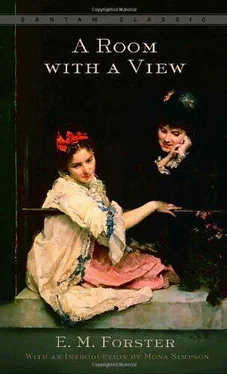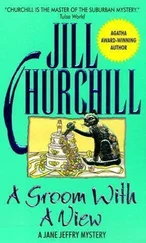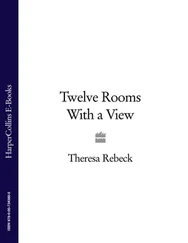Edward Forster - A Room with a View
Здесь есть возможность читать онлайн «Edward Forster - A Room with a View» весь текст электронной книги совершенно бесплатно (целиком полную версию без сокращений). В некоторых случаях можно слушать аудио, скачать через торрент в формате fb2 и присутствует краткое содержание. Жанр: Классическая проза, на английском языке. Описание произведения, (предисловие) а так же отзывы посетителей доступны на портале библиотеки ЛибКат.
- Название:A Room with a View
- Автор:
- Жанр:
- Год:неизвестен
- ISBN:нет данных
- Рейтинг книги:4 / 5. Голосов: 1
-
Избранное:Добавить в избранное
- Отзывы:
-
Ваша оценка:
- 80
- 1
- 2
- 3
- 4
- 5
A Room with a View: краткое содержание, описание и аннотация
Предлагаем к чтению аннотацию, описание, краткое содержание или предисловие (зависит от того, что написал сам автор книги «A Room with a View»). Если вы не нашли необходимую информацию о книге — напишите в комментариях, мы постараемся отыскать её.
A Room with a View — читать онлайн бесплатно полную книгу (весь текст) целиком
Ниже представлен текст книги, разбитый по страницам. Система сохранения места последней прочитанной страницы, позволяет с удобством читать онлайн бесплатно книгу «A Room with a View», без необходимости каждый раз заново искать на чём Вы остановились. Поставьте закладку, и сможете в любой момент перейти на страницу, на которой закончили чтение.
Интервал:
Закладка:
"Quite so."
"I do implore absolute secrecy. A chance word to a chattering friend, and—"
"Exactly." He was used to these nervous old maids and to the exaggerated importance that they attach to words. A rector lives in a web of petty secrets, and confidences and warnings, and the wiser he is the less he will regard them. He will change the subject, as did Mr. Beebe, saying cheerfully: "Have you heard from any Bertolini people lately? I believe you keep up with Miss Lavish. It is odd how we of that pension, who seemed such a fortuitous collection, have been working into one another's lives. Two, three, four, six of us—no, eight; I had forgotten the Emersons—have kept more or less in touch. We must really give the Signora a testimonial."
And, Miss Bartlett not favouring the scheme, they walked up the hill in a silence which was only broken by the rector naming some fern. On the summit they paused. The sky had grown wilder since he stood there last hour, giving to the land a tragic greatness that is rare in Surrey. Grey clouds were charging across tissues of white, which stretched and shredded and tore slowly, until through their final layers there gleamed a hint of the disappearing blue. Summer was retreating. The wind roared, the trees groaned, yet the noise seemed insufficient for those vast operations in heaven. The weather was breaking up, breaking, broken, and it is a sense of the fit rather than of the supernatural that equips such crises with the salvos of angelic artillery. Mr. Beebe's eyes rested on Windy Corner, where Lucy sat, practising Mozart. No smile came to his lips, and, changing the subject again, he said: "We shan't have rain, but we shall have darkness, so let us hurry on. The darkness last night was appalling."
They reached the Beehive Tavern at about five o'clock. That amiable hostelry possesses a verandah, in which the young and the unwise do dearly love to sit, while guests of more mature years seek a pleasant sanded room, and have tea at a table comfortably. Mr. Beebe saw that Miss Bartlett would be cold if she sat out, and that Minnie would be dull if she sat in, so he proposed a division of forces. They would hand the child her food through the window. Thus he was incidentally enabled to discuss the fortunes of Lucy.
"I have been thinking, Miss Bartlett," he said, "and, unless you very much object, I would like to reopen that discussion." She bowed. "Nothing about the past. I know little and care less about that; I am absolutely certain that it is to your cousin's credit. She has acted loftily and rightly, and it is like her gentle modesty to say that we think too highly of her. But the future. Seriously, what do you think of this Greek plan?" He pulled out the letter again. "I don't know whether you overheard, but she wants to join the Miss Alans in their mad career. It's all—I can't explain—it's wrong."
Miss Bartlett read the letter in silence, laid it down, seemed to hesitate, and then read it again.
"I can't see the point of it myself."
To his astonishment, she replied: "There I cannot agree with you. In it I spy Lucy's salvation."
"Really. Now, why?"
"She wanted to leave Windy Corner."
"I know—but it seems so odd, so unlike her, so—I was going to say—selfish."
"It is natural, surely—after such painful scenes—that she should desire a change."
Here, apparently, was one of those points that the male intellect misses. Mr. Beebe exclaimed: "So she says herself, and since another lady agrees with her, I must own that I am partially convinced. Perhaps she must have a change. I have no sisters or—and I don't understand these things. But why need she go as far as Greece?"
"You may well ask that," replied Miss Bartlett, who was evidently interested, and had almost dropped her evasive manner. "Why Greece? (What is it, Minnie dear—jam?) Why not Tunbridge Wells? Oh, Mr. Beebe! I had a long and most unsatisfactory interview with dear Lucy this morning. I cannot help her. I will say no more. Perhaps I have already said too much. I am not to talk. I wanted her to spend six months with me at Tunbridge Wells, and she refused."
Mr. Beebe poked at a crumb with his knife.
"But my feelings are of no importance. I know too well that I get on Lucy's nerves. Our tour was a failure. She wanted to leave Florence, and when we got to Rome she did not want to be in Rome, and all the time I felt that I was spending her mother's money—."
"Let us keep to the future, though," interrupted Mr. Beebe. "I want your advice."
"Very well," said Charlotte, with a choky abruptness that was new to him, though familiar to Lucy. "I for one will help her to go to Greece. Will you?"
Mr. Beebe considered.
"It is absolutely necessary," she continued, lowering her veil and whispering through it with a passion, an intensity, that surprised him. "I know—I know." The darkness was coming on, and he felt that this odd woman really did know. "She must not stop here a moment, and we must keep quiet till she goes. I trust that the servants know nothing. Afterwards—but I may have said too much already. Only, Lucy and I are helpless against Mrs. Honeychurch alone. If you help we may succeed. Otherwise—"
"Otherwise—?"
"Otherwise," she repeated as if the word held finality.
"Yes, I will help her," said the clergyman, setting his jaw firm. "Come, let us go back now, and settle the whole thing up."
Miss Bartlett burst into florid gratitude. The tavern sign—a beehive trimmed evenly with bees—creaked in the wind outside as she thanked him. Mr. Beebe did not quite understand the situation; but then, he did not desire to understand it, nor to jump to the conclusion of "another man" that would have attracted a grosser mind. He only felt that Miss Bartlett knew of some vague influence from which the girl desired to be delivered, and which might well be clothed in the fleshly form. Its very vagueness spurred him into knight-errantry. His belief in celibacy, so reticent, so carefully concealed beneath his tolerance and culture, now came to the surface and expanded like some delicate flower. "They that marry do well, but they that refrain do better." So ran his belief, and he never heard that an engagement was broken off but with a slight feeling of pleasure. In the case of Lucy, the feeling was intensified through dislike of Cecil; and he was willing to go further—to place her out of danger until she could confirm her resolution of virginity. The feeling was very subtle and quite undogmatic, and he never imparted it to any other of the characters in this entanglement. Yet it existed, and it alone explains his action subsequently, and his influence on the action of others. The compact that he made with Miss Bartlett in the tavern, was to help not only Lucy, but religion also.
They hurried home through a world of black and grey. He conversed on indifferent topics: the Emersons' need of a housekeeper; servants; Italian servants; novels about Italy; novels with a purpose; could literature influence life? Windy Corner glimmered. In the garden, Mrs. Honeychurch, now helped by Freddy, still wrestled with the lives of her flowers.
"It gets too dark," she said hopelessly. "This comes of putting off. We might have known the weather would break up soon; and now Lucy wants to go to Greece. I don't know what the world's coming to."
"Mrs. Honeychurch," he said, "go to Greece she must. Come up to the house and let's talk it over. Do you, in the first place, mind her breaking with Vyse?"
"Mr. Beebe, I'm thankful—simply thankful."
"So am I," said Freddy.
"Good. Now come up to the house."
They conferred in the dining-room for half an hour.
Lucy would never have carried the Greek scheme alone. It was expensive and dramatic—both qualities that her mother loathed. Nor would Charlotte have succeeded. The honours of the day rested with Mr. Beebe. By his tact and common sense, and by his influence as a clergyman—for a clergyman who was not a fool influenced Mrs. Honeychurch greatly—he bent her to their purpose, "I don't see why Greece is necessary," she said; "but as you do, I suppose it is all right. It must be something I can't understand. Lucy! Let's tell her. Lucy!"
Читать дальшеИнтервал:
Закладка:
Похожие книги на «A Room with a View»
Представляем Вашему вниманию похожие книги на «A Room with a View» списком для выбора. Мы отобрали схожую по названию и смыслу литературу в надежде предоставить читателям больше вариантов отыскать новые, интересные, ещё непрочитанные произведения.
Обсуждение, отзывы о книге «A Room with a View» и просто собственные мнения читателей. Оставьте ваши комментарии, напишите, что Вы думаете о произведении, его смысле или главных героях. Укажите что конкретно понравилось, а что нет, и почему Вы так считаете.












